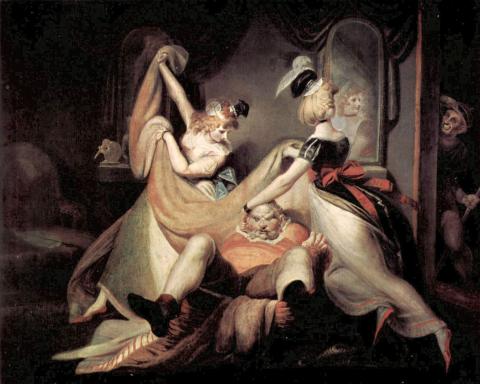The little known plays Part 2

In exclusiveness "of Windsor" there is nothing strange because here is a character who, even if he appeared not in the script of this comic remains the best comic character of Shakespeare. This is sir John Falstaff, a fat knight, a robber, a tireless seeker of fun, a lover of sherry, loud coward, furious bouncer and best friend of Prince Harry in both parts of the historical chronicle "Henry IV".
It is not surprising that Falstaff has been embraced by the public since its very first appearance on the stage. In "Windsor" he, however, loses its chivalrous recklessness, but appears in love or rather, clumsily taking care of the two honorable cities of Windsor at the same time. This confidence in its irresistible male virtues of playing with Falstaff cruel joke: provincial scoffer a few times very painful his play, and at the end of the Comedy forced to appear in Windsor Park in the image of a folkloric character with deer horns on his head.
In addition to the amusing misadventures of the fat knight, this piece immerses the reader in the atmosphere of a small English town, populated by good-natured ordinary people and eccentric freaks despite the small differences, they remain for each other good neighbors. The researchers repeatedly emphasized that the Windsor in this Shakespeare Comedy is very similar to his native Stratford, and the appearance in one scene, the boy William, who was forced in the middle of the street to take the examination in Latin, gives us a rare glimpse into the past of the playwright his own eyes.
"The two gentlemen of Verona" (circa 1590)
With confidence it is impossible to say what the plays of Shakespeare began his career as a playwright, but the Comedy "the Two gentlemen of Verona" is clearly written not quite Mature hand. Here, the author copes with scenes in which both are two or three characters, but they should have a foursome, and he did not really know what to do with them.
However, the awkwardness of a novice playwright is more than worth the features, in which lurks the real Shakespeare. "The two gentlemen of Verona" is a play about friendship and love, and, as usual with Shakespeare, friendship and love here are subject to serious tests. Yet this is the first Comedy in which a girl dresses boys to follow her beloved, and she, in disguise, has become a messenger to his new lover (a situation which is later repeated in "Twelfth night").
